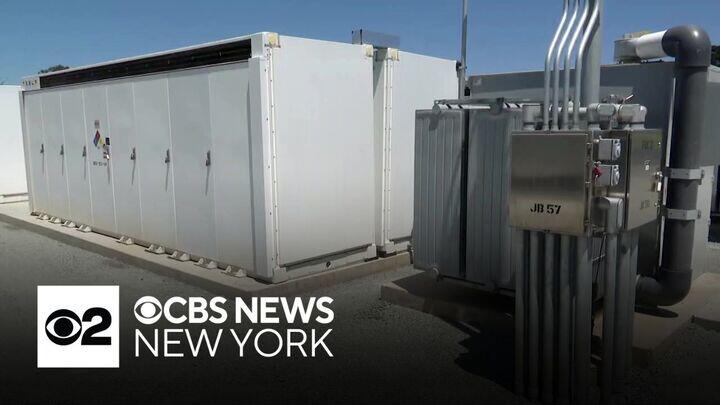One of the nation's largest battery energy storage sites is coming to Staten Island. Here's why residents are concerned.
One of the country's largest battery energy storage sites is about to be built on Staten Island. It's part of New York's push for renewable energy.
But families there say by the time they learned of the plan, it was already a done deal.
CBS News New York Investigates' Mahsa Saeidi looked into the potential risks the sites could pose, and the state's response to previous incidents.
How the site would work
The state approved a plan to convert the land into one of the nation's largest battery energy storage systems. Gov. Kathy Hochul wants New York to get the majority of its energy, from clean sources like solar, by 2030.
But since the sun isn't always shining, so-called "BESS" sites are critical for capturing surplus energy during the day and discharging it to the grid at night, or as needed
Though vacant, the stretch of land along Victory Boulevard is near homes. The developer, Chicago-based Hecate, says its facility will store enough energy to help the governor meet 10% of her overall storage goal, by powering every single home in the borough.
"It really has nothing to do with that. It has to do [with] the opportunity to buy electric cheap and sell it at a higher price," resident Mike Trollo said.
Staten Island residents cite lack of transparency
CBS News New York Investigates showed up to interview just a few homeowners but a roomful was waiting. Families said they understand the need for big batteries, but said the state didn't give proper notice, or make the process transparent.
"There are some pros to having these buildings, but there's a lot of downside," Frank Saladis said. "I think the main concern was the complete lack of communication."
"And if there was a fire, God forbid," Debra Bostwick said. "Who evacuates us? Where do we go?"
"There's two types of lithium-ion battery sites -- those that are on fire, and those that are not on fire yet," Assemblyman Sam Pirozzolo said.
"They keep putting them in residential areas. Don't you care about the citizens?" resident Angelita Rios-Kobryn said.
California fire on the minds of many on Staten Island
The community is more anxious due to a massive fire at a battery storage plant not operated by Hecate in Moss Landing, California. Four months later, the cause is still under investigation.
The site was the largest of its kind, with a capacity of 750 megawatts, which is only moderately larger than Hecate's proposed 650-megawatt facility.
Hecate, which has projects nationwide, said, "We have operated ... since 2019 without a single fire or safety incident, and are proactively meeting with elected officials, local residents ..."
Pirozzolo said he and some residents are also concerned with the how the company communicates.
"They're not responding to any of my emails, any of my phone calls," Pirozzolo said.
"Nobody seems to want to come out and educate us as to what's going on," Linda Duane added.
Saeidi called Hecate about the assemblyman's claim that the company is not responding to him. She got an email from the company saying, "Hecate Energy is committed to developing energy storage projects that incorporate local stakeholder feedback and community engagement is an important aspect of our development process. At this time, we are conducting studies that will inform the future of the project and we will engage with stakeholders as the project development progresses."
New York state's role in the debate
The Department of Public Service says the state held a public meeting online last year, with a notice sent to elected leaders, community groups, and the media.
But some homeowners, directly impacted, claim they missed the meeting because there was no notice in their mailbox.
CBS News New York Investigates asked DPS if the state would consider a second meeting, but the agency wouldn't answer that question.
There have been similar concerns in other neighborhoods, including Brooklyn and Long Island. Saeidi took their complaints to Gov. Hochul.
"Governor, New Yorkers say they're not getting any notice before battery energy storage sites pop up in their neighborhood. What are their rights, governor?" Saeidi asked.
Hochul did not respond, but in a webinar we found online, that just happened two weeks ago, the state is talking.
"We are in close communication with California regarding their incident," said David Sandbank, of the New York State Research and Development Authority.
- Read more: Lithium battery farm in New York's Hudson Valley getting pushback from homeowners over fire risk
After a series of fires at BESS sites in New York's Jefferson, Orange and Suffolk counties in 2023 -- none operated by Hecate -- the governor took action. To enhance safety, she convened the Inter-Agency Fire Safety Working Group.
"I wanted to explain to everybody who has concerns that we are taking this very seriously," Sandbank said.
Eleven recommendations are set to go into effect by 2026, including requiring site-specific training for local fire departments.
In the meantime, Pirozzolo says he's introducing a bill to require sites to be built 1,000 feet away from homes. He says right now they can be built anywhere.
"There is no protection for us. There's no protection for our people. No protection for the land," Rios-Kobryn said.





